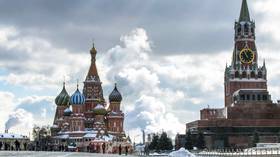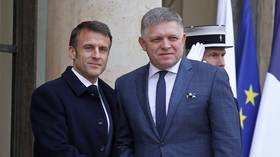Kremlin reacts to Macron’s remarks on NATO troops in Ukraine

A direct conflict between Russia and NATO will likely become inevitable if member states of the US-led military bloc send troops to Ukraine, Kremlin spokesman Dmitry Peskov has said. He was speaking after French President Emmanuel Macron, whose government hosted a high-profile meeting of Ukraine backers on Monday, said EU members “will do everything necessary to prevent Russia from winning” – including deploying forces on the ground to support Kiev.
Several governments have since ruled out sending troops to the front line.
Opponents of the proposal have arrived at a “sober assessment of the potential risks” of deploying NATO forces in Ukraine, Peskov told the media on Tuesday. That would be “absolutely against the interests of those nations” and their people, he warned.
Asked about the probability of a direct conflict with NATO if Western troops are sent to Ukraine, the Kremlin spokesman said, “in this case, we have to talk not about the probability, but rather the inevitability.”
German Chancellor Olaf Scholz has spoken out against the idea. Participants of the meeting in Paris came to an agreement against it, he told a news conference on Tuesday.
At a joint press conference in Prague on Tuesday, Czech Prime Minister Petr Fiala and his Polish counterpart, Donald Tusk, ruled out sending their citizens to fight in Ukraine. Senior officials in Hungary and Slovakia issued similar statements.
Macron said Western leaders could end up changing their minds in the future, similarly to how they did with military assistance – which in some cases initially involved items such as helmets to eventually donating lethal weaponry including tanks and fighter jets.
While there was no consensus over the proposal, the participants agreed to create a coalition to supply medium and long-range missiles to Kiev, the French president said.
Moscow considers the Ukraine conflict to be a US-orchestrated proxy war against Russia, and has repeatedly warned that by supplying increasingly sophisticated weapons to Kiev, NATO members are drawing closer to a direct confrontation.













